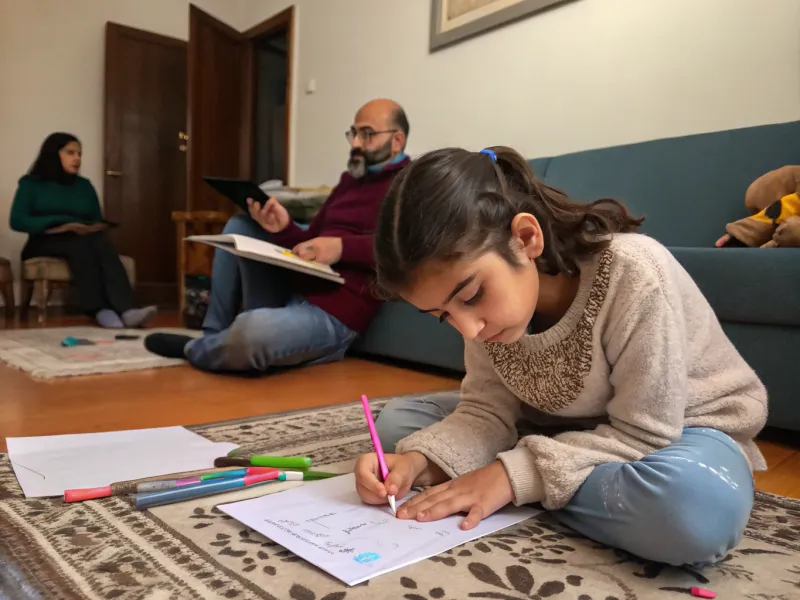Ever found yourself pondering over the quirks of your childhood? You know, those little things that seemed normal back then but now make you go, “Wait, what was that all about?” Today, we’re diving into the world of childhood experiences with a sprinkle of humor and a dash of empathy.
It’s all about those moments that might have been a bit more dysfunctional than we realized. Think of this as a friendly chat over coffee, where we laugh a little, reflect a bit, and maybe share an “aha” moment or two.
So, let’s jump into these 20 subtle signs that your childhood might not have been as picture-perfect as it seemed. No judgment here, just a space to explore and understand!
1. Emotional Neglect
Emotional neglect can be like wearing shoes a size too small—uncomfortable and hard to ignore, but somehow you managed. As a kid, maybe you didn’t get the hugs or words of comfort when needed. It wasn’t about not being loved; it was just not being expressed.
Maybe your parents were there physically but not emotionally connected, leaving you feeling a bit like an island.
Growing up, you might have brushed it off, thinking it was normal. But as an adult, you realize the impact on your ability to express emotions and connect with others.
Understanding this doesn’t mean blaming anyone. It’s more about recognizing patterns that might have shaped who you are today. Acknowledging it can be the first step toward healing.
Maybe it’s time to give yourself the emotional support you missed back then. A warm hug, even if just from yourself, can be oddly comforting. Remember, it’s okay to seek out therapy or talk to friends who understand. You’re not alone, and opening up can be liberating.
2. Enmeshment
Oh, enmeshment, the invisible web that ties everyone a bit too closely. Imagine growing up in a family where everyone’s business was everyone’s business. Privacy? Never heard of it. Your thoughts, feelings, and even friendships might have felt like community property.
In such environments, independence was a rare commodity. Decisions were often made as a group, and personal space was like a mythical unicorn. As a child, you learned to toe the line, blending your identity with those around you. Now, as an adult, untangling yourself from this web can feel like pulling apart spaghetti.
Realizing this pattern is the first step to creating boundaries. It’s okay to have your own thoughts and feelings. Practice saying “no” without guilt and explore what you genuinely enjoy. It might be daunting, but embracing your individuality is essential. And remember, there are others who understand this struggle.
3. Parental Favoritism
Ah, the classic tale of parental favoritism, where one sibling seems to hold the golden crown. Maybe your brother was the sports star, or your sister the academic genius. Meanwhile, you were left feeling like the understudy, waiting for your chance to shine.
This experience can seep into adulthood, fostering feelings of inadequacy and rivalry. You might even find yourself seeking validation in every little achievement. It’s like carrying an invisible scoreboard, always comparing yourself to others.
But here’s the truth: your worth isn’t defined by comparison. Acknowledging these feelings is crucial, and it might be time to redefine success on your terms. Celebrate your unique talents and remember that each sibling had their own challenges.
Healing might involve open conversations with family or seeking support from friends or a therapist. You’re more than enough just as you are.
4. Toxic Family Dynamics
Toxic family dynamics are like the storm clouds that never seem to clear. Arguments, silent treatments, and unpredictable moods might have been the norm. You learned to walk on eggshells, always anticipating the next eruption.
Growing up in such an environment teaches you to read the room with precision but often at the cost of your own peace. Now, as an adult, these patterns might manifest in your relationships, making you hyper-vigilant or conflict-averse.
Recognizing these dynamics is the first step toward change. It’s okay to distance yourself from negativity and seek environments that nourish your well-being. Building healthy relationships takes time, and seeking professional help can provide guidance.
Remember, you deserve a life filled with warmth and understanding.
5. Lack of Boundaries
Boundaries in childhood might have felt like lines in the sand, easily washed away by the tides of family demands. Whether it was your room, your thoughts, or your friendships, nothing seemed off-limits. Personal space was often a luxury, not a right.
As you grow, the absence of boundaries can lead to difficulties in asserting yourself. You might struggle to say “no,” fearing disappointment or conflict. It’s like living without a fence, leaving you vulnerable to the world.
But here’s the empowering part: you can build those boundaries now. Start by defining what feels comfortable for you and communicate it clearly. Practice makes perfect, and remember, saying “no” is a complete sentence. Building fences doesn’t mean you’re shutting others out; it’s about protecting your peace.
6. Unrealistic Expectations
Unrealistic expectations can feel like carrying a backpack filled with bricks. Maybe you were expected to excel in academics, sports, and social skills all at once. Anything less than perfection felt like a failure.
In adulthood, this pressure might manifest as chronic stress and a fear of making mistakes. The quest for perfection can be exhausting, leaving little room for self-compassion. You might even find joy in achievements fleeting, always chasing the next goal.
The key is to recognize that perfection is an illusion. Embrace your imperfections and learn to set realistic goals. Celebrate small victories and remember that progress matters more than perfection.
Therapy or mindfulness practices can help reframe these expectations. You’re worthy, and it’s okay to forge your path.
7. Conditional Love
Conditional love is like a reward system, where love and approval are doled out for achievements. Perhaps you felt loved only when you excelled in school or sports. It might have seemed like love was transactional, tied to your accomplishments.
This can lead to an endless pursuit of validation, leaving you questioning your self-worth. In adulthood, you might find yourself constantly seeking approval and fearing failure. It’s like being on a treadmill, never reaching the finish line.
The realization that love shouldn’t be conditional is a powerful awakening. Embrace your true self and seek relationships where love is given freely. Remember, you’re deserving of love just for being you. Therapy and self-reflection can aid in breaking these patterns and building healthier connections.
8. Emotional Volatility
Emotional volatility can be like living on a roller coaster, never knowing when the next dip will come. Perhaps one moment was filled with laughter, and the next with tears or anger. Growing up in such an environment teaches you to be on guard, always ready for the next emotional storm.
These experiences might lead to emotional instability in adulthood, where mood swings feel overwhelming. You might struggle to trust your feelings, fearing they’ll spiral out of control.
Understanding this pattern is the first step in finding emotional balance. Practice mindfulness or seek professional guidance to help you navigate these emotions. Building a support system with friends who understand can provide stability. Remember, it’s okay to feel and express your emotions.
9. Fear-Based Discipline
Fear-based discipline can feel like living under a dark cloud, always wary of stepping out of line. Maybe punishments were severe or unpredictable, leaving you in a constant state of anxiety. This approach might have shaped your behavior, making you compliant but fearful.
As an adult, this might manifest as a fear of authority or difficulty asserting yourself. You may find yourself avoiding conflict at all costs, even when it’s necessary.
Recognizing this pattern is essential for growth. Practice self-compassion and understand that mistakes are part of learning. Seek environments where you feel safe to express yourself. Therapy can provide tools to build confidence and assertiveness. Remember, you have the right to stand up for yourself.
10. Lack of Support
Lack of support can feel like learning to ride a bike without training wheels. Perhaps you faced challenges on your own, feeling like there was no safety net. Support was scarce, and you learned to be self-reliant, sometimes to a fault.
In adulthood, this might manifest as difficulty asking for help, fearing it shows weakness. You might even struggle with vulnerability, keeping others at arm’s length.
The first step is recognizing that seeking support is a strength, not a weakness. Build a network of friends or family who offer encouragement. Consider seeking professional guidance to explore these patterns. Remember, it’s okay to lean on others, and you don’t have to face everything alone.
11. Overprotection
Overprotection can feel like living in a bubble, shielded from the world but also limited in exploration. Perhaps your parents were overly cautious, restricting your activities to keep you safe. While well-intentioned, this might have left you feeling unprepared for life’s challenges.
As an adult, you might struggle with decision-making or fear taking risks. The world can seem daunting when you’ve always been sheltered.
Recognizing this pattern is the first step toward independence. Embrace small challenges and learn from them. Build resilience by stepping out of your comfort zone. Remember, it’s okay to stumble; each experience is a lesson. You’re capable of navigating life’s complexities with confidence.
12. Overinvolvement
Overinvolvement can feel like living in a fishbowl, constantly observed and guided. Perhaps your parents were highly invested in every aspect of your life, from your homework to your friendships. While it might have felt supportive, it could also feel overwhelming.
In adulthood, this might lead to a lack of autonomy, struggling to make decisions without guidance. You might even find yourself seeking approval for every choice, fearing making a mistake.
Recognizing this pattern can help you build independence. Practice making decisions on your own and trust your instincts. It’s okay to seek advice, but remember, you have the final say. Building confidence takes time, but each step is progress. You’re more capable than you realize.
13. Minimization of Feelings
Minimization of feelings can feel like having your emotions swept under the rug. Maybe when you expressed sadness or frustration, it was met with “It’s not a big deal” or “You’ll get over it.” Over time, you learned to suppress your feelings, believing they weren’t valid.
This can lead to difficulties in emotional expression as an adult, fearing judgment or dismissal. You might struggle to articulate your feelings, keeping them bottled up.
The first step is acknowledging that your feelings are valid and deserve to be expressed. Practice opening up to trusted friends or a therapist who understands. Remember, emotions are a natural part of being human, and sharing them can deepen connections. It’s okay to feel and be heard.
14. Unclear Roles and Rules
Unclear roles and rules can feel like playing a game without knowing the rules. Perhaps family expectations were inconsistent or constantly changing, leaving you unsure of your place. This might have led to confusion and anxiety, always guessing what was expected of you.
In adulthood, this might manifest as difficulty setting boundaries or understanding social norms. You may find yourself adapting to different roles, trying to fit in without losing yourself.
Recognizing this pattern is essential for building stability. Establish clear boundaries and communicate them effectively. Practice asserting your needs and understanding your role in relationships. Therapy can provide guidance in clarifying these dynamics. Remember, it’s okay to define your path and embrace who you are.
15. Parental Conflicts
Parental conflicts can feel like living in a war zone, with words as weapons and silence as a shield. Perhaps your parents argued frequently, and you found yourself caught in the crossfire. You might have played the role of mediator, trying to maintain peace.
These experiences can lead to difficulties in relationships, fearing conflict or becoming overly accommodating. You might struggle to express your needs, fearing it will lead to arguments.
Understanding this pattern is the first step toward change. Practice open communication and set boundaries in relationships. Therapy can provide tools to navigate conflicts healthily. Remember, it’s okay to express your needs and seek harmony without sacrificing yourself.
16. Overachievement Pressure
Overachievement pressure can feel like being on a hamster wheel, always running but never reaching the finish line. Perhaps success was emphasized, and anything less felt like failure. You might have been encouraged to excel in every area, from academics to extracurricular activities.
In adulthood, this might manifest as chronic stress, always striving for perfection. You may struggle to find satisfaction in accomplishments, always pursuing the next goal.
Recognizing this pattern is crucial for achieving balance. Set realistic goals and celebrate progress, not perfection. Practice self-compassion and understand that it’s okay to take a break. Therapy can provide support in navigating these expectations. You’re enough just as you are, and it’s okay to enjoy the journey.
17. Dismissal of Identity
Dismissal of identity can feel like wearing clothes that don’t fit, always trying to mold yourself to others’ expectations. Perhaps your individuality was discouraged, with pressure to conform to family norms. You might have felt like your true self was hidden, afraid of disapproval.
In adulthood, this can lead to a struggle with self-identity, constantly seeking validation from others. You might find it hard to embrace your uniqueness, fearing judgment.
The first step is recognizing that your identity is valid and deserves to be expressed. Embrace your individuality and explore what genuinely brings you joy. It’s okay to stand out and be yourself. Therapy or self-reflection can aid in building self-acceptance. You’re unique, and that’s your strength.
18. Inconsistent Parenting
Inconsistent parenting can feel like trying to solve a puzzle with missing pieces. Perhaps rules and expectations varied, leaving you unsure of what was right or wrong. One day, a behavior was acceptable, and the next, it wasn’t.
This inconsistency can lead to anxiety and confusion in adulthood, always guessing others’ expectations. You might find it hard to trust your judgment, fearing you’ll make mistakes.
Recognizing this pattern is essential for building stability. Establish clear boundaries and communicate them effectively. Practice trusting your instincts and understanding your values. Therapy can provide guidance in navigating these challenges. Remember, it’s okay to define your path and embrace who you are.
19. Neglect of Talents
Neglect of talents can feel like singing in a choir where no one hears your voice. Perhaps your unique abilities were overlooked, and support was lacking. You might have been encouraged to focus on traditional paths, leaving your passions unexplored.
In adulthood, this might lead to a lack of confidence in your abilities or fear of pursuing your dreams. You may struggle to believe in your talents, fearing they’ll go unnoticed.
The first step is recognizing that your talents are valuable and deserve attention. Explore your passions and seek environments that nurture your creativity. Therapy or mentorship can provide support in building confidence. Remember, it’s okay to shine in your own way and pursue what brings you joy.
20. Lack of Communication
Lack of communication can feel like living in a house with walls but no windows. Perhaps conversations were rare, and emotions were unspoken. You might have learned to keep your thoughts to yourself, fearing they’d go unheard.
In adulthood, this can lead to difficulties in expressing yourself or building connections. You might struggle to open up, fearing vulnerability.
The first step is recognizing that communication is a skill that can be cultivated. Practice expressing your thoughts and feelings with trusted friends or a therapist. Build connections by sharing experiences and listening actively. Remember, it’s okay to have a voice and to be heard. You’re not alone, and expressing yourself can lead to more meaningful relationships.





















